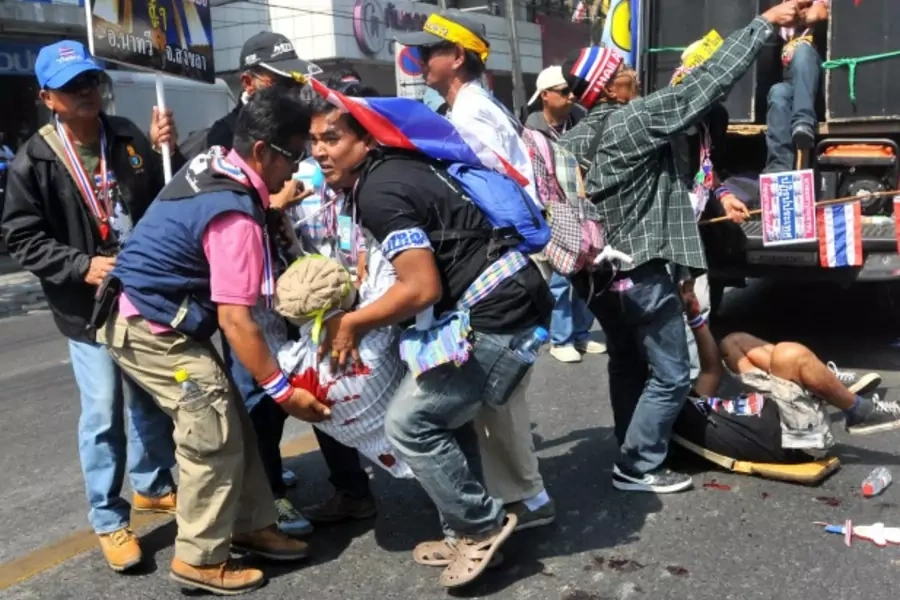Friday Asia Update: Top Five Stories for the Week of January 17, 2014

More on:
Darcie Draudt, Charles McClean, Will Piekos, and Sharone Tobias look at the top stories in Asia this week.
1. Explosions hit protestors in Bangkok. Two explosions hit anti-government protestors in Bangkok, Thailand on January 17, wounding more than two dozen people. Some reports claim the explosion was the result of an explosive device, such as a grenade. Since Monday, protestors have taken to the streets in opposition to the nation’s political system, which they demand be overhauled along with the resignation of Prime Minister Yingluck Shinawatra, whom they accuse of corruption. The protests, which have gathered around seven main intersection in Bangkok, started with 170,000 protestors on Monday and dropped to 60,000 people on Tuesday. By Friday, only 12,000 protesters were still on the streets. Though generally peaceful, the protest has been marred by small incidences of violence between the protesters and police during this week’s demonstration.
2. Buddhist mob allegedly kills Muslims in Burma. Buddhist mobs allegedly attacked members of the Rohingya Muslim minority in Rakhine state earlier this week, killing up to sixty people, after the disappearance of a policeman at a Rohingya village. Human rights groups report that security forces joined in the attack. Rakhine state officials denied that anyone was killed, but said that eighty-four Rohingya villagers were arrested. The United States has expressed “deep concern” about the reports and urged the government to investigate. At least 237 people have been killed and 140,000 displaced in the religious violence in the country since June 2012. Most of the victims have been Muslim Rohingya, who are denied citizenship and have less access to health care and education than Buddhists in the country. The Burmese government also uses the term “Bengali” to refer to the Rohingya, claiming that many are illegal immigrants from Bangladesh, though many have lived in Myanmar for centuries. The violence takes place as Burma begins its chairmanship of the Association of Southeast Asian Nations. As many as 230,000 Rohingya refugees have fled to Bangladesh, and thousands more live in refugee camps in Thailand.
3. U.S. Navy Realigns Carrier Fleet in Japan. On Tuesday, the U.S. Navy announced that the nuclear-powered aircraft carrier U.S.S. Ronald Reagan will replace the U.S.S. George Washington and become part of the U.S. 7th Fleet of forward-deployed naval forces stationed in Yokosuka, Japan. A specific timeline for the move has yet to be announced, but the Navy said in a press release that “The security environment in the Indo-Asia-Pacific requires that the U.S. Navy station the most capable ships forward. This posture allows the most rapid response times possible for maritime and joint forces, and brings our most capable ships with the greatest amount of striking power and operational capability to bear in the timeliest manner.” The Reagan is well known in Japan for assisting in Operation Tomodachi relief efforts after the March 11 triple disasters struck in 2011, but there are also local concerns about its use of nuclear power. The Washington became the first nuclear-powered aircraft carrier to be sent to Japan as part of the 7th Fleet when it replaced the U.S.S. Kitty Hawk in 2008.
4. Lunar New Year in China leads to holiday travel rush. China’s most important holiday, the Lunar New Year, has begun, and government officials estimate that Chinese people will travel by air, road, and railway 3.62 billion times over a forty-day period. The holiday officially only lasts a week, from January 31 to February 6 this year, but for many this is the only opportunity to return home for family gatherings. Travel delays are not the only concern however, as China is revealing a steadily increasing number of H7N9 bird flu cases. Health experts fear that the disease may be spreading, particularly as millions of Chinese will be traveling in the coming weeks. Fourteen new cases were announced this week alone.
5. Activists send balloons with information about the outside world into North Korea. Activists in South Korea, including some North Korean defectors, sent helium-filled balloons stuffed with propaganda materials into North Korea this week, including leaflets on human rights abuses, U.S. dollar bills, and small USB drives loaded with the Korean-language Wikipedia. North Korea has previously threatened to bomb South Korea in response to these actions and released an official statement saying that the launch is reminiscent of a “puppy knowing no fear of a tiger.” Seoul insists it has nothing to do with the launches, which have occurred often in the past. Thor Halvorssen, president of the U.S.-based Human Rights Foundation, participated in the balloon launch and wrote a detailed review of the experience.
Bonus: Impressive business card in hand, Chinese billionaire offers to buy New York Times. This past week, news of Chinese recycling magnate Chen Guangbiao’s boastful business card has rivaled coverage of his offer to buy the New York Times, an offer which was rejected on Tuesday. Including such monikers as “Most Influential Person of China,” “Most Well-known and Beloved Chinese Role Model,” and “Most Charismatic Philanthropist of China,” the now-infamous business card is not the only thing working against Chen’s proposal to buy the American newspaper. He claimed to come to New York to purchase foreign media assets, and his capability to run the American newspaper is bolstered because he is “very good at working with Jews.” Business cards with the owner’s photographed visage or such bombastic titling is not uncommon in Chinese culture, but is also considered showy.
More on:
 Online Store
Online Store
